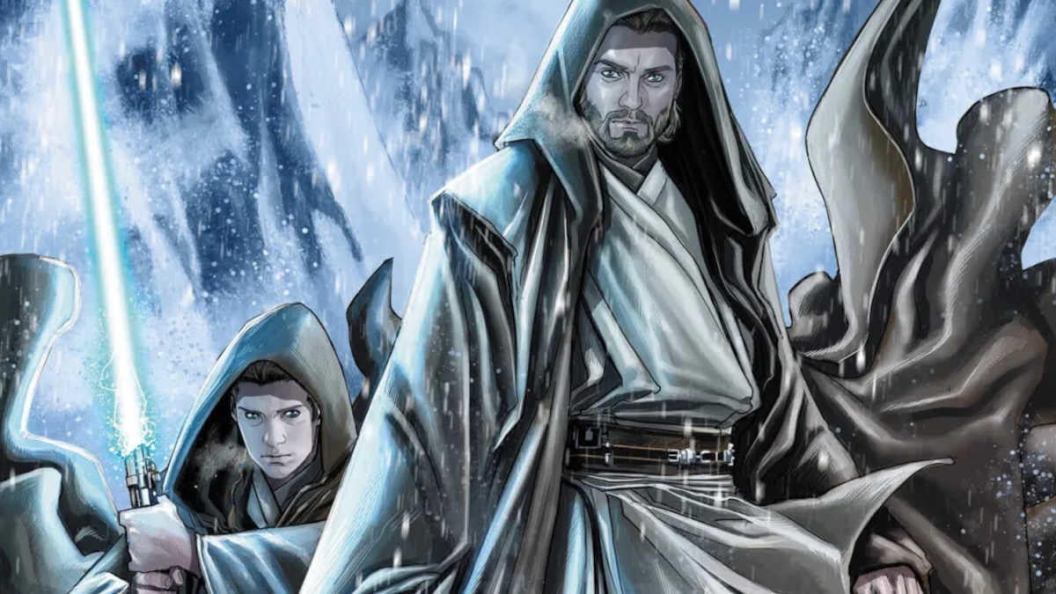
In an era dominated by sprawling cinematic universes and interconnected comic book sagas, the beauty of a truly standalone story is sometimes lost. Yet, tucked away in the vast library of Marvel Comics (which holds the Star Wars license), lies a gem that defies the relentless march of continuity: Star Wars: Obi-Wan and Anakin by Charles Soule, with art by Marco Checchetto. Published in 2016, this five-issue miniseries is not just a forgotten piece of Star Wars lore; it is, arguably, one of the finest Star Wars stories to emerge in decades. This isn’t a galaxy-spanning epic; it’s an intimate character study, a quiet exploration of the early bond between two of Star Wars’ most iconic figures, and the cracks that would eventually lead to their fracturing.
The Weight of Expectation Shapes Obi-Wan and Anakin’s Early Interactions

The title itself, Obi-Wan and Anakin, might conjure images of their more famous partnership during the Clone Wars or even the tragic confrontation on Mustafar. However, this series takes readers back much further, to a time when Anakin Skywalker was still a young Padawan, grappling with the pressure of his destiny. At the same time, Obi-Wan Kenobi was a relatively new master, navigating the complexities of mentoring a boy prophesied to bring balance to the Force, all while trying to live up to the promise he made to Qui-Gon Jinn. Set three years after the events of Star Wars: The Phantom Menace, the story finds them stranded on a desolate, forgotten planet, forced to confront not only the dangers of their environment but also the doubts and fears within themselves.
The brilliance of Obi-Wan and Anakin lies in its masterful portrayal of the characters’ internal struggles and their evolving dynamic. Anakin, still a child in many ways, is already burdened by the weight of the Jedi prophecy and the expectations placed upon him by the Jedi Council. Though revered, the Jedi Council does very little to mentor, protect, or support Anakin in the way someone so extraordinary and gifted needs. Anakin feels isolated, different, and misunderstood. Soule perfectly captures Anakin’s impatience with traditional Jedi teachings and his deep-seated fear of failure. There are also glimpses of the arrogance that will later consume him, but also the genuine desire to do good and live up to the promise of his potential.
Obi-Wan, on the other hand, is still finding his footing as a master and grappling with the death of his own master. He’s dedicated and wise beyond his very young years, but he’s also acutely aware of the responsibility of training the Chosen One. He struggles with how to best guide Anakin, knowing that the boy’s emotional intensity clashes with the Jedi’s tenets of detachment.
Their journey on a forgotten world becomes a crucible, forcing them to rely on each other in ways they haven’t before. Through flashbacks interwoven with their present situation, Soule subtly reveals the foundations of their relationship – the moments of connection, the flashes of mutual respect, and the quiet anxieties that simmer beneath the surface. It’s in these subtle nuances that the series truly shines, offering insight into the human (and near-human) cost of their extraordinary circumstances.
The Series Illuminates the Nuances of the Jedi Code and Its Impact on Individuality
The story delves into the pressure cooker environment of the Jedi Temple, where young Anakin’s unique abilities and background set him apart, fostering a sense of alienation that Obi-Wan, for all his compassion, sometimes struggles to bridge. However, the most signficant reveal is that Obi-Wan, a Jedi known for upholding the tenents of the Order, informed Yoda that he would leave the Jedi Order and train Anakin on his own if Anakin no longer wanted to be a Jedi. Yoda points out that Obi-Wan’s admission is essentially heresy against he Jedi and a crime, but Obi-Wan does not waver; his dedication is not to the Jedi, but to Anakin and his promise to Qui-Gon Jinn to train him.
Beyond this bombshell confession, Obi-Wan and Anakin continues to critique the Jedi Order itself. While not overtly rebellious, the story subtly questions the rigidity of the Jedi Code and its potential to stifle individuality and emotional expression. Anakin’s struggles with attachment, his desire for deeper connection, and his occasional bursts of frustration are not simply presented as flaws; they are portrayed as natural human responses that the Jedi, in their pursuit of stoicism, often fail to provide a support system for and adequately address.
The forgotten planet Anakin and Obi-Wan are stranded on, with its own unique culture and moral ambiguities, serves as a powerful metaphor for the choices and compromises that come along with wielding great power. The planet’s inhabitants, divided and fractured, mirror the internal conflicts within Anakin and, to a lesser extent, Obi-Wan. This external conflict forces the Master and Apprentice to confront difficult ethical dilemmas, pushing them beyond the black and white dictates of the Jedi Code and into the messy reality of the real world that exists in shades of gray. It’s in these moments that the seeds of doubt are sown, not just in Anakin, but in the Jedi Order itself, foreshadowing the eventual collapse.
Soule masterfully uses this isolated setting to heighten the emotional stakes, creating a contained drama that feels epic in its implications for the characters’ future. The choices they make, the lessons they learn, or fail to learn, on this desolate world reverberate throughout their later lives, making this seemingly small story a crucial piece of their larger history together. The alien culture they encounter also presents a fascinating counterpoint to the Jedi way, highlighting different philosophies on emotion, family, and conflict, which further challenge Anakin’s perception of his place within the Jedi Order.
Star Wars: Obi-Wan and Anakin is a triumph of character-driven storytelling. It’s a series that understands the core of its characters, delving into their vulnerabilities and aspirations with a remarkable depth. It doesn’t rely on explosive action sequences or universe-altering revelations; instead, it finds its power in the quiet moments, the unspoken tensions, and the psychological exploration of its iconic leads. In a landscape often dominated by extravagance, this standalone miniseries is a testament to the enduring power of an intimate tale of two people whose lives are forever linked.
If you’re a fan of Star Wars, or simply appreciate well-crafted character studies, this often-overlooked gem deserves your attention. Obi-Wan and Anakin is a reminder that the best stories don’t always need to be the loudest; sometimes, the most impactful moments are found in the quiet spaces between the grand galactic conflicts.
The post The Best Star Wars Story in Decades is One You Probably Never Read appeared first on ComicBook.com.



